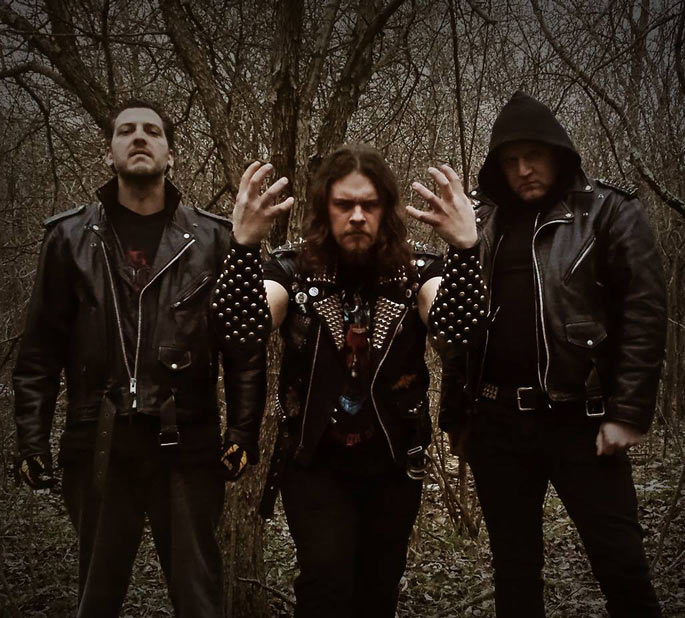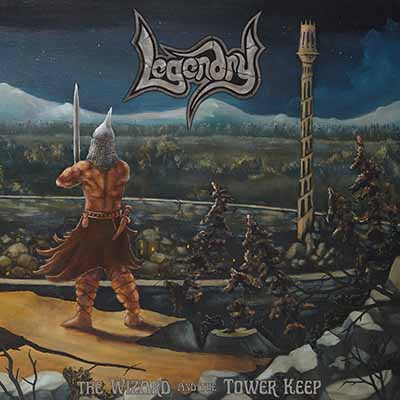Welcome to our humble pub here in the city of Ardona, far beyond the world you know. Have a seat and a tankard of ale while we listen to The Bard tell us of The Warrior with No Name. Here we await the presence of Vidarr, himself a bard of no mean renown, and the man behind the metal majesty of LEGENDRY, a band reveling in stories of courage, danger and high adventure.
Vidarr knows much of the Warrior’s tale and has used LEGENDRY to tell the story. The latest chapter is The Wizard And The Tower Keep, which tells of the Warrior’s battle with the wizard Vael. The music of LEGENDRY owes much to forefathers of both ’70s and ’80s such as RUSH, MANILLA ROAD, BROCAS HELM and more. Let us now see if Vidarr will share his lore with us…

WHERE STEEL WINDS BLOW
Interview with Vidarr of LEGENDRY
By: Dr. Abner Mality
REBEL EXTRAVAGANZA: Greetings, Vidarr! Let me first ask you what came first for you…love of music or love of fantasy?
VIDARR: Well, I would say for sure, a love of music came first, but I came to love fantasy art/literature/film/etc. at a young age as well. I got into power metal music when I was around 11 or 12, first hearing BLIND GUARDIAN and HAMMERFALL, and ever since, I’ve always appreciated music with that medieval fantasy aesthetic. In hindsight, it seems that I’ve sought the medieval fantasy aesthetic in most genres, from dungeon synth, to the first few KING CRIMSON albums, to black metal, and of course epic metal, it has been a constant focus.
RX: Was there one band more than any other that led to you following the path of epic metal.
VIDARR: The answer here is MANILLA ROAD. When I first heard them, of course starting with Crystal Logic, I knew it was something special and unique. There really is no other band like them. They don’t fit neatly into any of the major metal subgenres, and their independent spirit is evident throughout their discography: never making the same album twice, and always staying true to their own path.
RX: Some bands like RUSH and MANILLA ROAD can be easily seen as influences on LEGENDRY. But what were some of the less obvious or less likely influences on your style?
VIDARR: Well, it may be somewhat obvious; judging by the acoustic opening track, but JETHRO TULL is a major influence: I have every album, and I rarely go more than a day or two without spinning one. Outside of that, FRANK ZAPPA, as a guitarist, has been a long-standing influence on me as a player and composer. I read his autobiography a couple times, and picked up a lot of great information on the realities of creating music, and the mindset of creating audio space. In addition, KING CRIMSON and the guitar philosophy of Robert Fripp, along with a host of mainly 1970s progressive rock. I have also been increasingly interested in the dungeon synth genre. Created (essentially) by MORTIIS in the early ’90s, I have only in the past several years begun to dig further into the genre, which was/is an exclusively underground and cassette-based form of DIY ambient music. It’s fascinating stuff, and while the ease of production may be reason for a cluttered genre, there are truly some great works in this style. While I listen to, and take influence from a wide variety of genres, heavy metal is a language I feel I can speak the most fluently.
RX: Unless I miss my guess, I can also detect a good deal of classic ’70s prog in LEGENDRY. Who were some of the prog bands you draw inspiration from?
VIDARR: ’70s prog is a huge part of the sound, to be sure. The obvious bands like YES, RUSH, GENESIS, and KING CRIMSON are up there for me, especially the inclusion of mellotron on the album being equal parts a callback to Robert Fripp and a love for the sound. Some of the other ’70s prog/rock bands I really have been into lately are LUCIFER’S FRIEND, DUST, ELOY, CAMEL, WiISHBONE ASH, GRYPHON, SOFT MACHINE, and SIR LORD BALTIMORE. There really is just a wealth of weird music out there, and I’m constantly discovering new old albums to obsess over.
RX: You go out of your way to add unusual, quirky sounds and instruments into the music on The Wizard And The Tower Keep. It seems so many bands today just use the “standard” instruments and “standard” production and tunings. How important was it for you to keep the “quirk factor” in LEGENDRY’s music?
VIDARR: The “quirk factor” as you put it, is both a way to keep things interesting, and expand the tonal palette of LEGENDRY. I used some odd things, like real swords to create the sound effects (I also held that same sword in hand while recording all of the vocal tracks in the studio, to get the vibe right!), field recordings I had made for the storm sounds, wind chimes, and other foley sound effect techniques for other parts. We did tune in E standard for everything though, so no odd tunings, although, not down-tuning in a metal band today may seem odd. The quality of the songs comes first, but to take a quote from FRANK ZAPPA, adding those extra details is “putting the eyebrows on it”.
RX: Do you see a broadening use of different instruments in future recordings? Or is there a certain point past which you won’t go?
VIDARR: I think while including a variety of instruments is interesting, I also wouldn’t want to push it to a point where it’s a main focal point of the band, so perhaps that’s where the limit would lie. In addition, I wouldn’t want to include modern-sounding synthesizers in LEGENDRY, as I’d like to keep things as “period correct” to the ’70s and ’80s as possible.
RX: How would you recreate the rich sounds of songs like ‘Sorcery’s Bane’ and ‘Earthwarrior’ live? Use pretape or maybe just soldier on as a 3-piece?
VIDARR: I use an Electro Harmonix Mel9 pedal to recreate the mellotron sounds on the album live for ‘Earthwarrior’ , ‘Sorcery’s Bane’, and the title track of the album, but the songs written as a three piece, so they do not rely on the studio details to maintain interest in a live setting. I like the idea of creating a huge sound with only a trio format, and minor changes are made to the arrangements and improvised solo sections each time the songs are played, so they are in themselves moving entities, and not static mimeses when performed. Some bands are very concerned with replicating the recorded album in a live setting down to the last detail, but this has never been a goal of mine.
RX: How important is the mandolin to LEGENDRY? What got you into this instrument?
VIDARR: For ‘The Bard’s Tale’, I wanted to make the guitars sound a bit different, as in the novelette, the bard in the Ardonian tavern is not necessarily playing a guitar from Earth. So I’ve dubbed the 12 string plus mandolin arrangement the “20 string guitar”. It, along with the balalaika (which I also play), are in some ways related to Scandinavian black metal, in the sense of the intensely tremolo picked riffing. All this said, I think that JETHRO TULL got me into the idea of learning and including it in LEGENDRY.
RX: What are some of your fantasy influences? What was the first great tale that you remember?
VIDARR: Well, I think unremarkably, it would have to be The Hobbit and The Lord Of The Rings, which I actually became interested in after hearing BLIND GUARDIAN’s Nightfall In Middle Earth. I was nearly finished reading The Fellowship Of The Ring when the Peter Jackson films were announced, and was dismayed to find that the nerdy secret books I had been reading were now no longer so secret.
RX: I would say the lyrical influences of Tolkien and Robert E. Howard are apparent, but what are some of the lesser known fantasy works you are inspired by? (For myself, I always loved the Kane stories of Karl Edward Wagner, which I highly recommend)
VIDARR: I think that in all honesty, I haven’t read a great deal of fantasy. Apart from Tolkien and Howard, I’ve read a lot of Jack Kerouac and Kurt Vonnegut (whose sci-fi author character of Kilgore Trout I’ve always enjoyed).

RX: I understand the songs on The Wizard And The Tower Keep all revolve around the adventures of a nameless warrior who’s appeared on past LEGENDRY works. Tell us more about the story and this character…
VIDARR: The central Warrior with No Name (or sometimes referred to as Earthwarrior) was transported to the planet of Eyrn through an electrical mishap in a lightning storm by way of an electric guitar and URIAH HEEP record. Once on this distant planet, he had no choice but to become a proficient hunter, and then warrior to survive in the hostile wilds of the realm. His weapons and armor were robbed from an ancient tomb, and through the Mists Of Time and Dungeon Crawler albums, the tracks which follow him deal with his adventures facing evil forces and raiding the catacombs and monstrous lairs which lay in the forgotten places of Eyrn. The depiction on the Dungeon Crawler album is of his encounter with the Demon of Evermourn: an ancient entity which served as the guardian of the Eye of the Kings. The Eye of the Kings is a jewel which holds the powers of dimensional travel, and once the Warrior slays the beast, its power once again radiates out, to the attention of the evil wizard Vael. The warrior takes the stone in hand as treasure to trade for supplies in the city of Ardona, within the walls of which lie the Tower Keep: the lair of Vael. Once within the city walls, Vael sends demonic entities to attack the warrior and retrieve The Eye. Upon the defeat of the attackers, the Warrior, through the guidance of the Lady in Blue at the tavern in Ardona, begins a quest through the catacombs of the city into the Tower Keep to face the wizard head-on in battle. This story was published by Millhaven Press in their Fierce Tales: Savage Lands anthology.
RX: Do you consider yourself a full-fledged fantasy author? Do you have any books or stories coming out?

VIDARR: I really don’t know. I consider myself as an artist who creates things. These things are usually music, paintings, and now literature, but could also be just about anything else. I find that the act of doing or creating comes from the same part of my brain, regardless of the medium, so I just think of it as the same act/thing. The second part of the story of the Earthwarrior was just published in the Swords Of Steel Omnibus Edition by DMR Books, and is entitled ‘Beyond The Mirrors Of Faellnoch’. The anthology is notable, because it includes a number of fantasy tales written by heavy metal musicians. I highly recommend it!
RX: Any idea of how LEGENDRY’s sound may evolve in the future?
VIDARR: I have ideas to work in even longer song forms, and I am gearing up my mind to begin writing the album which will follow ‘Beyond The Mirrors Of Faellnoch’. The form it will take is unclear, but there are no ideas lacking – I have plenty of possible directions to take it, musically.
RX: Any live plans?
VIDARR: At this time, there are no live plans, but hopefully these opportunities will arise in the near future. Personal and professional commitments make it impossible to embark on a traditional tour.
RX: Any last words to the faithful?
VIDARR: We are grateful for the positive response the album has gotten. A great deal of work went into it, and to see that the ideas and qualities we included are being well received and have been communicated the way we intended is very rewarding.